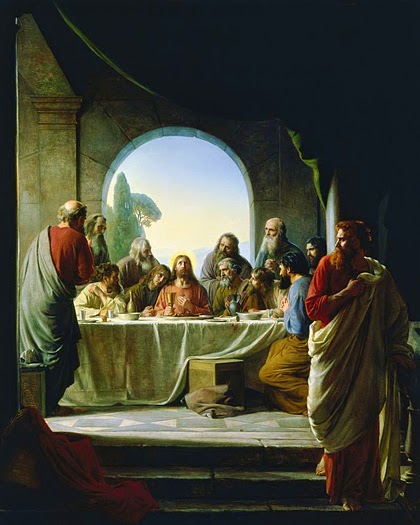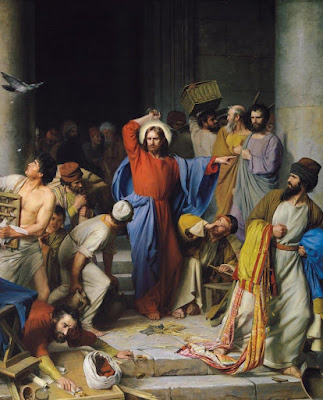Then Jesus spoke, and what He said at that moment had never before been said at a Passover meal. "Take, eat. This is my body, which is given for you." And again, after the supper, Jesus took a chalice of wine, gave thanks and then said something that had never before been said at a Passover meal, "This cup is the new covenant in my blood." And in doing this, Christ treated the Passover as if it was His own to do with as He pleased – and in fact He could, because it was and is the Lord’s Passover.
With these words, Jesus transformed the Passover meal forever. Under the outward form of the bread, He gives His body as food – the very body He received from His mother Mary; the body that was conceived in her through the Word spoken by the angel in the power of the Holy Spirit; the body that was wrapped in swaddling-clothes and laid in a manger; the body that was whipped and beaten, spit at and slapped; the body that was nailed to the cross, laid in the tomb, and raised from the dead on the third day.
And in the cup, He gives His blood. This is the blood of the Lamb of God, who takes away the sin of the world. The medieval artists who depicted a chalice at the foot of the cross and a stream of blood pouring into it from the wounded side of Jesus understood the force of Christ’s words, because the blood that was shed on Calvary's cross is our drink.
Christ our Passover has been sacrificed. He was offered up for our sins on the Cross, and in the celebration of the Holy Sacrifice of the Mass, this offering is perpetually brought before the throne of Almighty God.
It is in the context of the Upper Room, of Jesus' washing the feet of His disciples and His feeding them His body and blood, of His humbling Himself to His coming death on a cross, that Jesus then says to His disciples, "A new commandment, I give to you, that you love one another; even as I have loved you that you also love one another." Two more times, Jesus says it in His Upper Room sermon: "This is my commandment, that you love one another as I have loved you." And again, "These things I command you that you love one another."
Of what things does Christ speak? What is new about this so-called "new commandment?" It's not love – that’s not new. The commandment to love is an old one. No, what's new is in how Jesus gives His love, by washing us and feeding us. Through baptism and the Holy Sacrifice of the Mass – and indeed through all the Sacraments – this is how our Lord communicates His love to us. These are Christ’s mandates, His "commandments" by which we are able to love one another as we have been loved by Him. This is what Jesus is saying: "This is my commandment, that you be fed with my Body and my Blood, just as a branch is fed by the vine to which it is attached, so that you may love one another with the love with which I have loved you." "A new commandment I give to you, that you be washed by me and be fed at my table, so that you may love one another as I have loved you."
Jesus' new commandment to His disciples is to receive His love in all the ways He has to give, to be loved by Him so that His love would flow through them to one another. His love poured out for us in His death, poured into us through Baptism and through the Holy Sacrifice of the Mass, bears fruit as His love has its way with us. The same Body that bent down as a servant to wash the feet of His disciples, now bends our bodies down to help cleanse one another, by forgiving one another, by loving one another. He said, "By this all will know that you are my disciples, when you have love for one another."
We do not love in order to be loved by God. Jesus loved us, long before we loved Him. While we were yet sinners, He loved us and laid down His life for us. His was "love to the loveless shown, that they might lovely be."
We love one another because we already are loved by God in Jesus Christ. And we now receive His love so that we can love one another as He has loved each one of us. This is the commandment given to us by the Lord Jesus Christ – and with that truth, we celebrate this Holy Night so that we can be prepared for the glory of our Lord’s resurrection.
O God, who in a wonderful Sacrament hast left unto us a memorial of thy Passion: grant us, we beseech thee, so to venerate the sacred mysteries of thy Body and Blood; that we may ever know within ourselves the fruit of thy redemption; who livest and reignest with the Father, in the unity of the Holy Spirit, ever one God, world without end. Amen.













